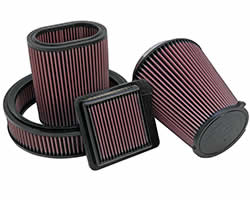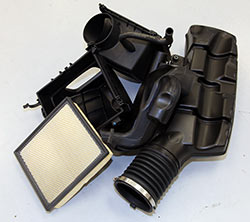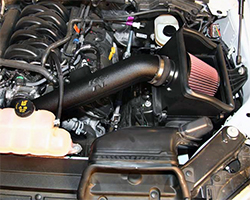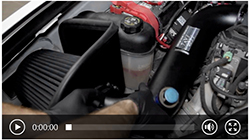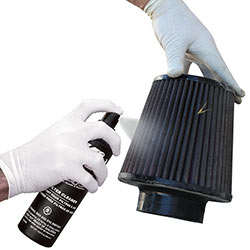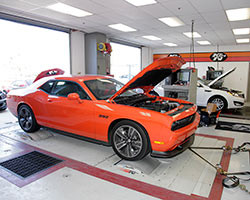How Does a Cold Air Intake Work? K&N Explains the Benefits of Air Intake Systems.
- 5 Feb 2016
What Does a Cold Air Intake Do?In 1969, K&N introduced the reusable, high-flow cotton gauze air filter. This revolutionary performance air filter was initially designed for racing, but soon found its way onto countless street cars and custom built hotrods. By the late 80's, fuel injection was becoming the industry standard, so K&N introduced the idea of bolt-on performance air intakes. Like its first high-flow air filter, its new cold air intake systems were proven to significantly increase horsepower and torque, and they quickly became the gold standard for custom car builders, off-roaders, racers, and performance enthusiasts across the globe. Today, K&N cold air intake systems are the go-to performance upgrade for anybody wanting to increased horsepower and torque from their vehicle’s engine. These bolt-on performance kits are easy to install, and the reusable cotton gauze air filters are warrantied for 10 years or one million miles. But let's look at how they work. How a Cold Air Intake System Works
The best way to explain a cold air intake system is to think of your car's engine like a pair of lungs. In order to make power, the cylinders have to inhale air to create the explosion that produces wheel-turning horsepower and torque. Since cold air contains more oxygen molecules than warm air, injecting a higher volume of oxygen-rich air into the cylinders allows the engine to burn fuel more completely during the combustion cycle. This "combustion efficiency" results in an increase of horsepower and torque, using roughly the same amount of fuel. Put simply, if you add oxygen to a fire, you get a stronger fire. K&N cold air intake systems are designed to deliver more oxygen-rich cold air into the engine than a stock air intake tract. This results in a stronger 'explosion', which contains more force to push the piston down and turn the crankshaft. That extra energy/power is then transferred to the transmission and out to the wheels. O2 = HP
The resulting horsepower gain varies by product and application, but each K&N cold air intake system has been designed to increase airflow efficiency for specific vehicles and their engines. Each of K&N’s performance air intake kits undergo significant testing to ensure that the high-flow K&N air filter and intake tube is positioned to collect and deliver the coolest air possible. An engine bay is filled with low-performing warm air, and if the air filter placement is less than ideal (usually due to space limitations), K&N cold air intake systems will use application specific air filter heat shields to prevent warm air from entering the system. Breathing in More Power
Clean air is vital to the performance of not only the engine, but a cold air intake system as well. That's why each K&N performance intake system comes with a K&N high-flow cotton gauze air filter. These legendary K&N air filters are made with 4-6 layers of our proprietary cotton gauze material sandwiched between 2 layers of rugged aluminum mesh. When combined with the unique K&N filter oil, the cotton fibers are able to attract contaminants that are smaller in diameter than a human hair. This type of filtration is called "depth loading", and it keeps dirt particles trapped within the matrix of cotton fibers, while more air flows through to the engine. K&N air filters typically score 97%-99% filtration efficiency following the ISO 5011 Air Filter Test protocol. Installing a K&N Cold Air Intake System
Thanks to extensive Research & Development, K&N engineers are able to create cold air intake systems that are extremely effective, yet easy to install. Most K&N performance intakes can be installed using the factory mounting points, so you typically won't need more than a few wrenches and a screwdriver. But regardless of which system you choose, it will come with a step-by-step instruction guide, complete with photos of each step, and a tool list. Plus, the K&N Technical Support team is just a phone call away. K&N WarrantyBesides increasing horsepower and torque, a K&N cold air intake system will save you time and money. Every K&N air filter can be washed and reused over and over again. So, you won't have to buy a new air filter every 10,000-15,000 thousand miles. Just wash out your K&N air intake air filter every 100,000 miles (depending on driving conditions), then re-install it. The entire K&N cold air intake system is backed by the K&N 10-year/Million Mile Limited Warranty, so you get guaranteed performance and guaranteed quality. Street Legal Air Intakes
Many K&N cold air intake systems are completely street legal in all 50 states, and will come with a California Air Resource Board (CARB) Executive Order (EO) number which guarantees that particular air intake kit has been tested to comply with the current emissions standards. EO numbers apply to the kit, as well as to the year, make and model of vehicle that it is being installed on. Intake systems without an EO number are street legal in most states, but cannot be installed on emissions controlled vehicles in the state of California, or other states that have adopted California emission standards. You can use K&N's search by part tool to learn which cold air intakes are CARB exempt, and for which vehicles. K&N Air Intake Horsepower GainsWe can't guarantee that you will get a specific horsepower and foot-pounds of torque, because things like the mileage, modifications and condition of your exact vehicle will factor into the final number. But we can show you the dyno results for a vehicle just like yours, that's been fitted with one of our many K&N cold air intake systems. Benefits of a K&N cold air intake include:
Plus, K&N also manufacture lots of other racing and automotive performance parts like high-volume fuel pumps, oil filters, and carbon fiber hood scoops. So to check out what's available for your vehicle, use the K&N search by vehicle tool. Or, you can use the K&N dealer locator to find a K&N dealer near you. |
||||||
|
||||||

